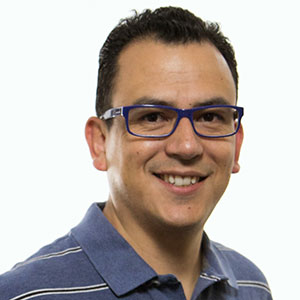Lino Coria earned his PhD in electrical engineering from the University of British Columbia. He’s currently a computer vision engineer at Wiivv Wearables and partner at Scribble Consulting. Find him online here and follow him on Twitter @linocoria.
What did you hope for in terms of employment as you completed your PhD?
I wanted to become a professor in my native Mexico. I am very passionate about education, especially in a country such as Mexico. There is a lot of work to be done.
 What was your first post-PhD job?
What was your first post-PhD job?
I was a professor at the department of electronics, systems and informatics at ITESO University, a private university located in the Guadalajara Metropolitan area (Mexico). It was a job I truly enjoyed. Because of personal reasons, my wife and I decided that it was best for our family to relocate to Canada. I got a postdoc position at my old UBC lab.
What do you do now? (How did you get this job?)
I am a computer vision engineer at Wiivv Wearables. Wiivv is a bionics company that creates 3-D printed, custom gear using 3-D-mapping technology, accessible by everyone from a smartphone.
I was approached by a recruiter, asking me if I was interested in this job. At the time, I was working as a senior research engineer at another company.
What kind of tasks do you do on a daily and weekly basis?
Daily: I develop computer vision algorithms that analyze images in order to identify and measure human body parts. I also test the performance of these algorithms. I work closely with bio-mechanical, design, hardware, and software engineers.
Weekly or bi-weekly: I write reports that highlight the improvement of our algorithms. I do a live demo for everyone at the company showing what I have been working on.
What most surprises you about your job?
I am surprised by how quickly I have been able to learn. The first two months were particularly tough as I had to learn to use some tools that were completely new to me. Now I feel very comfortable using them and can add that experience to my resume.
What are your favourite parts of your job?
I like to discover elegant solutions to complicated problems. I cannot go into details but we were able to identify a novel way of solving one of our greatest challenges. It was a game changer.
What would you change about it if you could?
I wish I had more time to play with new ideas. Everything I currently work on has an immediate application.
What’s next for you, career-wise?
I am not sure. Technically, I want to get more experience with deep learning.
However, I am also very interested in education, storytelling and technology. I have been creating digital content for children that speak both English and Spanish, which is the case with my daughters. I would love to be able to continue exploring that and turn it into a successful business. This is the idea behind the company my wife and I have founded called Scribble Consulting.
What advice or thoughts do you have for post-PhDs in transition now?
- Talk to a lot of people: invite them a cup of coffee and learn from their experience.
- Be willing to change the way you do things if there is good evidence that doing so might bring benefits.
- Build a (digital) portfolio of your work. Be ready to show it at any time.
- Print business cards and have an up-to-date LinkedIn profile.
- Take online courses if you realize there are some key skills that you need to master (I love Udacity, edX and Coursera).

It’s so great to see a STEM profile here. Thanks Jen and Lino!
Really great to see another example of someone with a PhD now working in Tech. 🙂